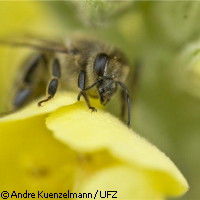The buzz on the decline of the honey bee
World-renowned physicist Albert Einstein once said: 'If the bee disappears from the surface of the earth, man would have no more than four years to live. No more bees, no more pollination, no more men!' A team of scientists has found that the number of bee colonies in central Europe has shrunk over the years, and the number of beekeepers in Europe has declined since 1985. The findings, presented in the Journal of Apicultural Research, add weight to an escalating problem. The results are part of the EU-funded ALARM ('Assessing large-scale environmental risks with tested methods') project, which received more than EUR 12.5 million under the 'Sustainable development, global change and ecosystems' Thematic area of the Sixth Framework Programme (FP6). The study's findings are significant because they cover the majority of Europe, not just individual countries. According to the researchers, the honey bees are not alone in their fight for survival; wild bees and hoverflies are also feeling the pressure. The results show that pollinator services will feel the crunch, and in turn so will arable crops. The scientists evaluated data that were made available from national reports and beekeeper magazines to determine the overall number of bee colonies and beekeepers. Based on these records, the team reconstructed bee colonies between 1965 and 1985 for 14 European countries, and between 1985 and 2005 for 18 European countries (save for Spain, France and some eastern European EU Member States). Their findings reveal that both western and central Europe have been sustaining losses in the number of bee colonies since 1965. The Czech Republic, Norway, Slovakia and Sweden have also been reporting dwindling numbers since 1985. On a positive note, however, southern Europe and in particular Greece, Italy and Portugal reported increases in the number of colonies between 1965 and 2005. Most scientists speculate that social and economic changes are responsible for the decline; beekeeping as a hobby is not what it used to be. Manual labour gave way to machines, and rising incomes of the rural population made products that were based on sugar better suited for everyone's pockets. 'The price of treating bee diseases has increased to the extent that the cost of treatments may equal or exceed the income from a colony for an entire year, thus making it uneconomic to keep bees on a small scale,' said lead author Dr Simon G. Potts of the University of Reading in the UK. 'Moreover, the effort for treating disease, in particular V. destructor [Varroa destructor is an external parasitic mite that attacks honey bees], has probably also reduced the attractiveness of beekeeping as a hobby.' Despite the results of the study, more research is needed. 'With the limited evidence available it is neither possible to identify the actual driver of honey bee losses in Europe nor to give a complete answer on the trends for colonies and beekeepers,' explained co-author Dr Josef Settele of the Helmholtz Centre for Environmental Research (UFZ) in Germany. 'This obviously creates an urgent demand for a standardisation of evaluation methods, especially on colony numbers. Such harmonised reliable methods will be the obvious backbone for any research to understand and mitigate honey bee colony losses.' Led by Dr Settele, the ALARM project brought together more than 200 researchers from 35 countries and 68 partner organisations.



